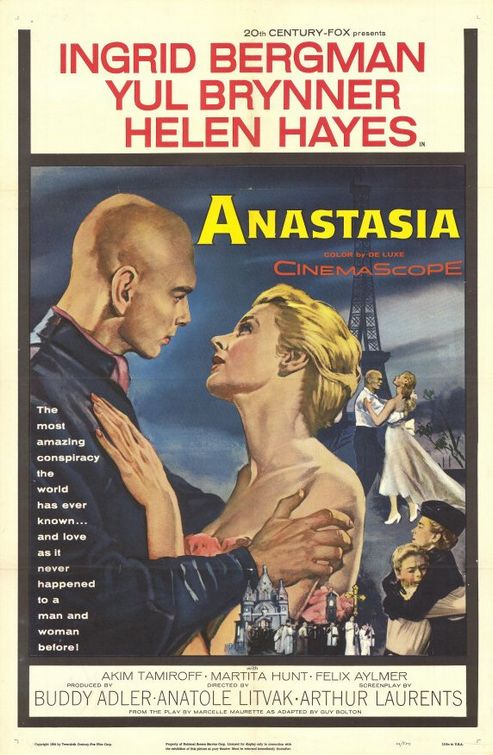- Anastasia (1956 film)
Infobox Film
name = Anastasia

caption =
director =Anatole Litvak
producer = Buddy Adler
writer =Marcelle Maurette (play)Guy Bolton (adaptation)Arthur Laurents
starring =Ingrid Bergman Yul Brynner Helen Hayes
music =Alfred Newman
cinematography =Jack Hildyard
editing =
distributor =20th Century Fox
released =December 13 ,1956 (US release)
runtime = 105 min.
country = US
awards = Bergman: NYFCC Award for Best Actress
Golden Globe for Best Motion Picture Actress (Drama)
Brynner: NBR Award for Best Actor
language = English / French
budget =
amg_id = 1:2169
imdb_id = 0048947
"Anastasia" is a 1956
20th Century Fox historical drama film directed byAnatole Litvak . The film starsIngrid Bergman ,Yul Brynner , andHelen Hayes . Supporting players includeAkim Tamiroff (who earlier worked with Ingrid Bergman in the film "For Whom the Bell Tolls"),Martita Hunt (who provides comic relief as a fluttering lady-in-waiting), and, in a small role,Natalie Schafer (familiar to television audiences from her later role on "Gilligan's Island ").The film tells the story of a young, confused woman in 1920s
France (Ingrid Bergman), who is picked up and influenced by a group of Russian expatriates, led by Yul Brynner, into passing herself off asGrand Duchess Anastasia Nikolaevna of Russia , the daughter of the murderedTsar Nicholas II of Russia . However, the ultimate test for her is to convince the Dowager Empress, Maria Feodorovna (Helen Hayes), of her authenticity.Plot
The film was loosely based on the true story of a former inmate in a German asylum who became known as '
Anna Anderson ' and whose story made headlines for decades. However, the Russian monarchist movement never backed Ms. Anderson, nor did she ever meet with the Dowager Empress, played by Hayes. The script plays with the question of Anna/Anastasia's identity.Ten years of turmoil have passed since the teenage Anastasia and her sisters and brother were presumably killed. Does the refugee Anna who has turned up in Paris have the bearing, speech, and intimate knowledge of the imperial family that the real grand duchess would have? Or is she merely an apt pupil of General Bounine (Brynner), a recovering amnesiac with a striking resemblance who has been cleverly groomed by the émigré general to stake a claim to 10 million pounds left by the Tsar in an English bank? In a series of encounters with former familiars and members of the imperial court, Anna begins to display a confidence and style that astonish her skeptical interlocutors, yet retains our sympathy by seeming more interested in recovering her own identity than the imperial bank account. In a "tour de force" climactic meeting with the Empress in Copenhagen, Bergman and Hayes take the measure of each other, alternately projecting imperial self-possession and the anguish of family longing. Meanwhile Bounine has become increasingly jealous of the attentions the fortune-hunting Prince Paul pays to Anna. At a grand ball at which her engagement with Paul is to be announced, the Empress has a private word with Anna/Anastasia, who subsequently elopes with Bounine.
Hayes summons all her stage experience to deliver the celebrated last line, summing up the film's poignant exploration of identity and role-playing. Asked how she will explain the vanishing of her supposed granddaughter to a ballroom full of expectant guests, she declares, "I will tell them that the play is over, go home!" The film closes with the regal figure of the Dowager Empress on the arm of Prince Paul, descending the grand staircase.
Film adaptation
The movie was adapted by
Guy Bolton andArthur Laurents from the play byMarcelle Maurette . The structure of the play can still be detected in the static settings and theatrical "scenes" of the cinematic version, which has additional, essentially decorative ball scenes. It was directed byAnatole Litvak .The film marked Bergman's return to Hollywood after several years in self-imposed exile, following the scandal that resulted from her romance with director
Roberto Rossellini . Furthermore, "Anastasia" won her anAcademy Award for Best Actress , the second of three Oscars she would receive. Themusical score from the film was also nominated for anAcademy Award for Original Music Score and was popular after the film's release.Animated feature
*An animated musical version of "Anastasia" was made in 1997 by
Fox Animation Studios . See: "Anastasia (1997 film) ".References
External links
*imdb title|id=48947|title=Anastasia
*tcmdb title|id=67292|title=Anastasia
*amg movie|id=1:2169|title=Anastasia
*rotten-tomatoes|id=1031763-anastasia|title=Anastasia
Wikimedia Foundation. 2010.
